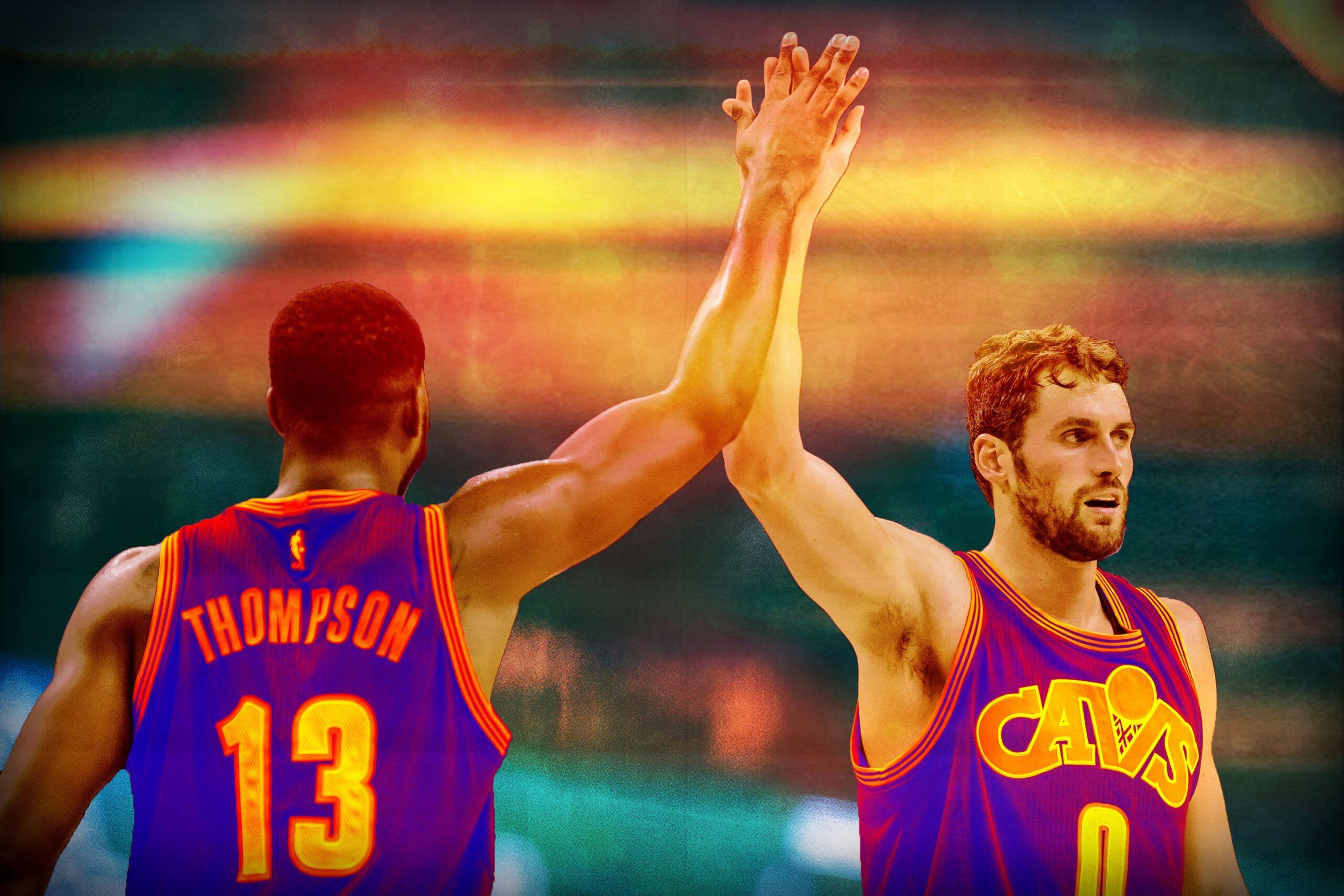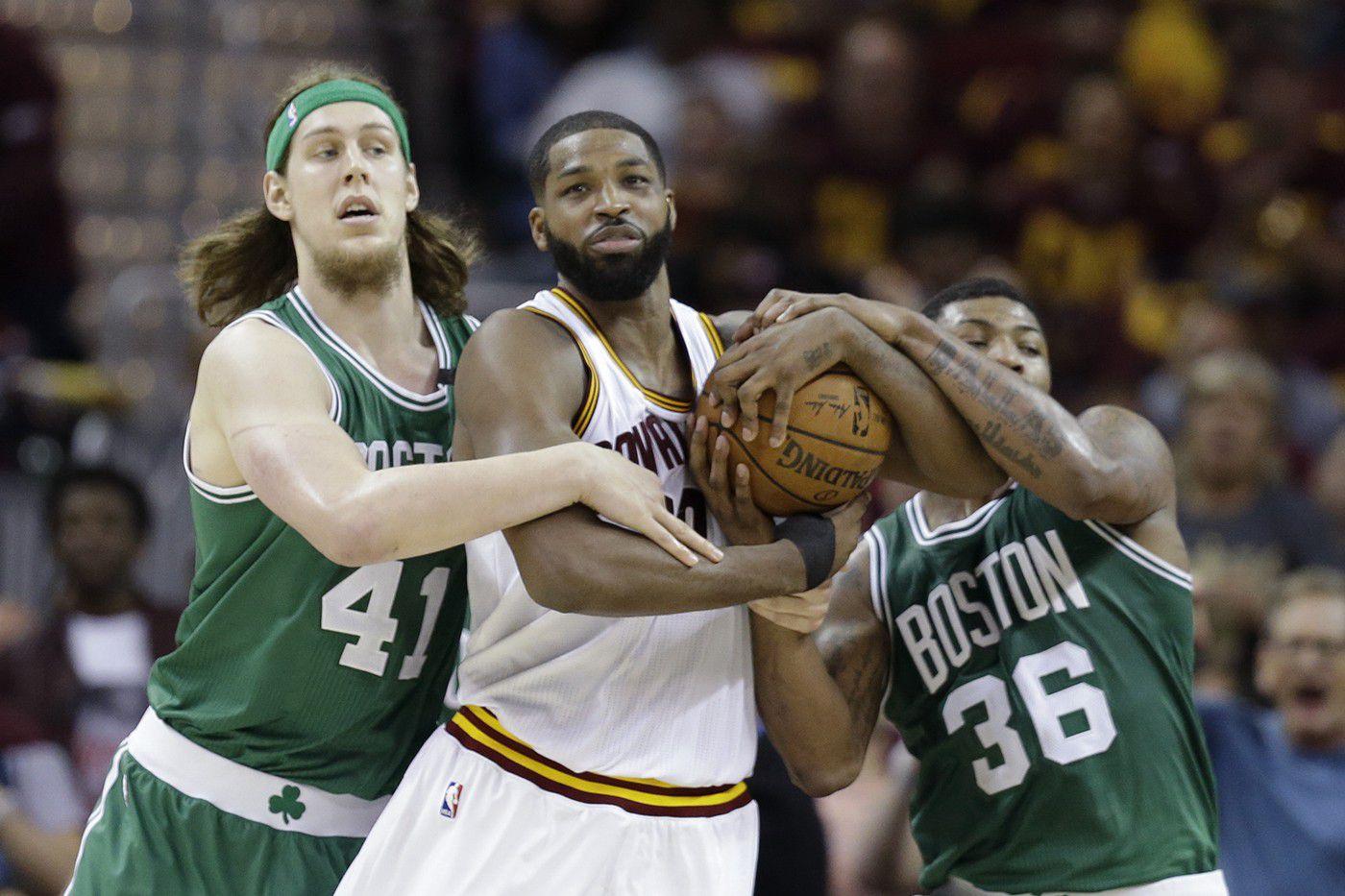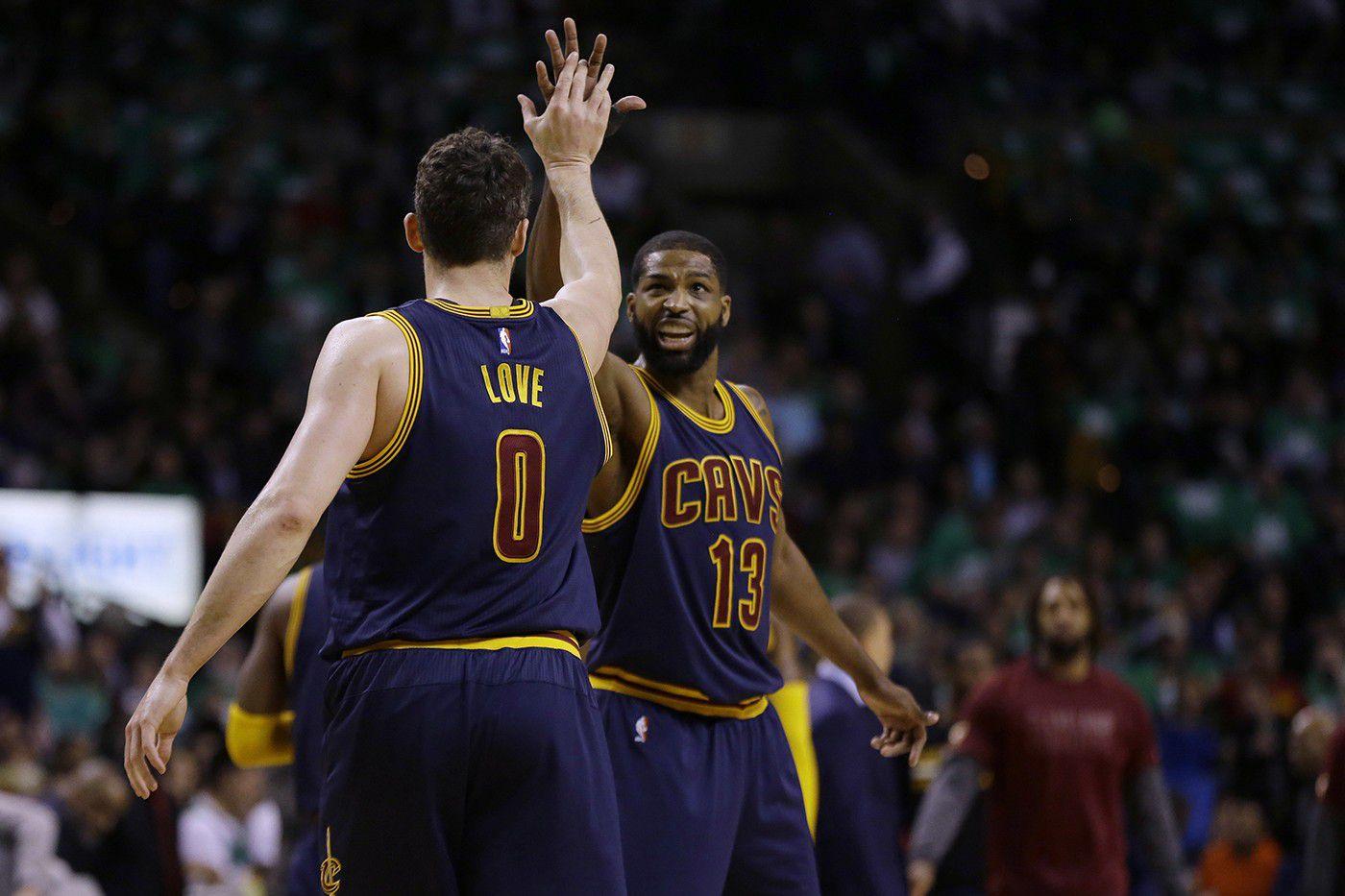
Perhaps LeBron James is best understood as a job creator, without all of the iniquity that title carries in the outside world. For all the character assassination critics have subjected James to over the course of his life, it’s hard to imagine a better teammate to play with, a better player to serve as a springboard to a more realized self. James’s mere presence provides an apparatus for talent to vine: Without LeBron, it’s possible that Kyrie Irving is thought of as little more than the second iteration of Stephon Marbury; Tristan Thompson as the disappointing top-four draft pick who never developed into anything more than what he was out of college. Had James not gone home, it’s possible that Kevin Love would have continued down the humiliating path he was on in Minnesota as one of the most talented players in NBA history never to have seen the postseason.
Instead, all three were folded into LeBron’s cinematic universe, at the core of which is the NBA Finals. (After seven straight seasons at the height of professional basketball, it’s probably fair to say that the Finals are part of LeBron’s intellectual property.) Instead, we understand his supporting cast as who they’ve become: champions.
We’ve also seen the growing pains along the way in real time. Subsuming to James’s grand vision of his team is graduate-level NBAing; no player in the Cavs’ current playoff rotation has less than five years of experience. It’s funny how the best thing that could happen to a career is often also the most challenging. Learning how to play alongside greatness has been harder for some than others.
"It’s definitely been tough; it hasn’t been a smooth road for any of us," Kyrie Irving said during NBA Finals media availability Wednesday. "But for [Kevin Love], I’ve just constantly told him just to be himself. That’s it. We don’t want anybody else. Kev… you’re boundless. Your potential is endless, and we believe in you, so go out there and f’ing play like it."
He has, or at least he’s come close. Love is putting up 17.2 points and 10.4 rebounds in the postseason so far, hovering just below his regular-season averages. On the hierarchy of power, Love belongs in the third tier alongside fellow glorified role player Thompson, yet receives the rah-rah hypeman bump of a player a tier or two above. In fairness to Love, the uneasiness about his situation over the last two seasons has melted away, evidenced by how comfortable he looked speaking at media availability a day before Game 1, delighting in both LeBron’s pursuit of greatness and Draymond Green’s gift of gab on the court. Things were so different just a year ago. The first turning point of the 2016 Finals was Game 3, a game Love sat out of due to concussion protocol; the Cavs won that game by 30. There was a loud chorus of skeptics certain that the Cavs would be better off trading Love. Then, of course, Love made the defining play of his career, a play that, frankly, doesn’t accurately define him as a basketball player at all.
But it’s been that uncertainty — those wild jerks of fate in multiple directions — that has guided Love in his path to acquiescing as a role player.
A popular mantra that supporting players tend to tell themselves at the behest of the coaching staff is be a star in your role — to commit as fully to boxing out, or being attentive on back cuts, or catching a ball immediately into the shot pocket as a franchise player would to creating a game-winning opportunity. To be so good at the unspectacular elements of the game that you become an indispensable cog in the machine without the ambition of ever becoming the machine itself. Love doesn’t fit neatly into that reading of a role player’s mentality. It goes back to why Irving, three years into this magical ride, still feels compelled to pump up Love (who was an All-Star this year, by the way) in a public forum. From the macro view, Love is a supporting player on the Cleveland Cavaliers, but they need his latent star power to manifest within the gaps. They’ll need everything against these Warriors.
Love may not have the physical makeup to be versatile in the ways that modern basketball tends to demand, but versatility isn’t limited to the ability to ably defend four or five positions. For Love, versatility means having the ability to compartmentalize the player he was, the player he’s become, and the player that, in a lot of ways, is still learning how to play alongside greatness — and access those compartments on a moment’s notice. It seems as mentally exhausting as it is physically, but you could say that if Love didn’t demonstrate the capacity for it, the Cavs wouldn’t have won the championship last season.

On that same tier in the Cavs hierarchy is Tristan Thompson, whom ESPN’s Zach Lowe called an "elite role player" in an excellent, career-spanning profile. It’s a fascinating characterization not because it’s false, but due to all the factors that have to be in place for that distinction to hold up.

Thompson is a unique physical specimen, even by NBA standards: He is indefatigable; he is one of the strongest players in the league; his low center of gravity affords him leverage against big men down on the block and the lateral maneuverability to hound players on the perimeter; he can displace opponents with his backside and has the hand-eye coordination to tip balls where they need to go, whether that’s to his other hand, to another player, or to the rim itself. In short, Thompson would be the same player on any team in the league, but being the same player does not inherently mean he’d have the same value. Playing alongside two of the best shot creators in the league in LeBron and Kyrie, as well as a phalanx of sharpshooters from behind the arc, means Thompson often gets to bully whoever he’s boxing out without intervention. "You get a stop against LeBron, and he gets another rebound," Kyle Korver said to Lowe about Thompson. "It’s so frustrating. It sucks all the wind out of you."
Thompson’s strengths run contrary to nearly every other player on the roster, which is exactly why he’s found such an integral role on the team; no one else can do what he does. Thus, Love and Thompson are among the rarest commodities in the league, because a role player can be only as good as the system he is born of. The line between an elite role player and an overpaid non-star is almost imperceptible.
Compared with Love’s more traditionally gaudy numbers, it’s harder to illustrate Thompson’s value with raw data, but that doesn’t mean he doesn’t have the figures to back up his worth. Over the last 50 years of the NBA, there have been 475 players who have played in at least 50 playoff games. Only one player (Jeff Foster) has a higher career playoff offensive rebounding percentage than Tristan Thompson, and he played almost exactly half the amount of minutes Thompson has logged in roughly the same amount of games up to this point.
So far, Thompson’s three postseasons have not reached the heights of Dennis Rodman’s inconceivable run in his final five playoff seasons, wherein he had an average OREB% of 16.4, but Thompson, at 15.4, isn’t far off. Rodman’s production peaked at the end of his career, from age 32 to 36; Thompson is 26. As long as he is ensnared in LeBron’s orbit, Thompson will have the opportunity to build upon his résumé; he’ll have a chance to be known as the greatest postseason offensive rebounder in history*.
(In fairness to history, we don’t have records of Wilt Chamberlain’s offensive-defensive rebounding splits, so we’ll never know just how high his OREB% was, though it’s probably safe to say there would be no contest. Hence the asterisk.)
It sounds like an overly narrow distinction, and it is. But it’s a level of granularity that reflects the level of competition. With the two best teams in the league at the summit, every detail is magnified. Every rock skipped across the court leaves ripples, and each ripple is pregnant with consequence. A Tristan Thompson offensive rebound keeps the ball out of Steph Curry’s hands. Keeping the ball out of Curry’s hands prevents what, these days, has turned into an immediate five-point swing. A two-rebound advantage on the offensive glass is enough to alter the course of history. And don’t the Warriors know it.

In his media availability interview, Draymond Green mentioned that he hadn’t heard 3–1 being discussed in the locker room all season long. Green was hoping to issue the final word on the past, but that’s not the way history works. 3–1 will continue to roam the halls of NBA history like a spirit whose purpose hasn’t been fulfilled on earth, enriching the lives of those whose petty souls delight in schadenfreude. It still haunts the Warriors to this day, even if it isn’t overtly discussed by the team. Last season’s implosion has permeated the mentality of this year’s Warriors iteration. You can read the subtext. The Warriors, night in and night out, before, during, and after games, have stressed the importance of winning the possession battle: cut down on turnovers and avoid giving the opposition second-chance opportunities. Because in a four-point Game 7 loss, the Warriors had their output off turnovers and second chances more than doubled by the Cavs, 33–16. The Warriors know exactly how they can lose, and they’ve broadcasted that knowledge since Day 1 of this season.
It goes without saying that LeBron James will have to continue on what has been an all-time postseason run for the Cavaliers to have a shot at winning this title. But it’s Cleveland’s third tier that codifies the major points of emphasis that the Cavs need to hit. They are one of the most explosive offenses in NBA postseason history, but can Kevin Love deliver in the minutes when they need him to be a star in the post against Kevin Durant or Draymond Green? Can Love stay vigilant on Green for long enough so that both he and Thompson can remain on the floor to crash the glass for Cleveland? The Warriors brought in one of the best basketball players in the world last summer to sandblast the issues they had in last year’s Finals against two glorified role players. The playing field isn’t the same as it was last year — not with a healthy Curry and Kevin Durant in for Harrison Barnes. But LeBron is, as ever, the rising tide. It’s time to find out just how high the armada behind him can be lifted.

